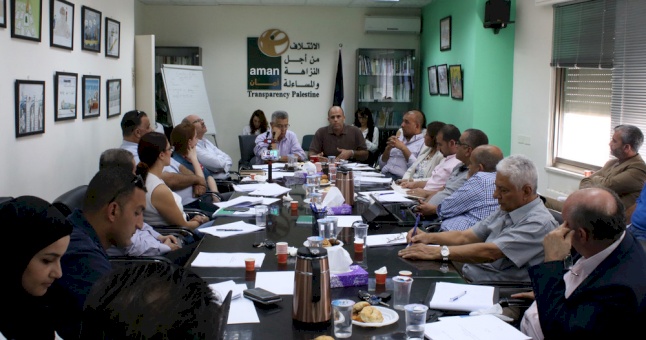
The participants at the discussion the Coalition for Accountability and Integrity –AMAN held on the role of regulatory bodies of electricity, water and telecommunication sectors recommended a clear-cut policy be developed with a view to enacting a law governing critical service management privileges and monopoly. A set of principles should be adopted abided by the minsters and senior officials to govern the privatization process and hold the government responsible for providing good quality services at affordable cost to ensure fair public access.
The audience featured a diverse group of representatives from the key stakeholders, chief amongst them, the Ministry of Telecommunications and Information Technology (MoTIT), the Water Sector Regulatory Council, the State Audit and Administrative Control Bureau, Civil Society Organizations (CSO), and the private sector. The session was given over to highlight an array of problems arising from the lack of a law that has a final say on privileges and monopolies of critical service provision and management. Although there are several bylaws on public service management fundamentals, powers vested in relevant regulatory bodies, and relationships amongst relevant public institutions, the delay plagued the conclusion of the subsequent regulations and the enforcement of the Decree-Bylaw on the Telecommunications and Information Technology Regulatory Council.
At the outset, Dr. Moien Barghouti, the writer of the paper under discussion, stated that the raison d'etre of the paper is to analyze and review the Palestinian experience in establishing and activating the regulatory bodies holding the whip hand for strategic service sectors. It also aims to examine the existence of a legally and institutionally governance-driven environment conducive for these bodies to shoulder and fulfill their responsibilities; especially, their remit related to the quality and price of such services and the provision control mechanisms.
“The paper arrived at an array of results, including the lack of a law on privileges and monopoly, inadequate capacity-building efforts on front of the regulatory bodies, and resistance to the role of such bodies due to the interest conflicts amongst with other government stakeholders,” he underlined. This is also exacerbated by the fluctuating government performance at this lead. Whereas the regulatory bodies of the electricity and water sectors are established, the telecommunications and information sector still stands in need of a regulatory body undeterred by the Decree-bylaw on the Telecommunication and Information Regulatory Council.
By the same token, the paper puts forward a set of recommendations. First, a clear policy should be developed as a prelude to the adoption of a law on the privileges granted within the remit of critical service management and operation. On the same page, an assortment of principles on privatization should be adopted and be binding to the ministers and officials without prejudice to the responsibility of government of providing these services in a good quality and at an affordable price to ensure fair public access. It also recommended the government adopt a standard policy in pursuit of an effective supervision by the regulatory bodies of the government-owned companies and private companies that provide services to the members of the public. Finally, the paper recommended crystal-clear standard controls be in place to promote the performance of regulatory bodies without leaving a legroom for conflict of interests with the respective competent authorities.
As the Telecommunication Law No. 3 of 1996 stands, Riad Hamarsheh, Legal Counsel at the MoTIT, shed the light on the role of the Ministry as the regulatory authority of this sector. He also confirmed that a great deal of efforts has been made to issue a novel law on the telecommunication sector in lieu of the Law No. 15 of 2009 due to the several flaws and contradictions therein, which necessitated several amendments be made thereto.
“The Cabinet has discussed the second reading of the bill to be presented to the members of the public, CSOs and other relevant stakeholders in the offing. Their input as well as the remarks and recommendations, which have been already put forward in the paper under discussion, will be considered” Mr. Hamarsheh confirmed.
On his part, Mohammad Al -Hmaidi, Water Sector Regulatory Council CEO, underlined that the troubled and unclear legal framework of the Council remit constitutes one of the key problems facing it. This issue takes an added gravity under the absence of true political will to clear up the role of such bodies, and thus increase their effectiveness; let alone the inadequate government financial allocations to these bodies, and the conflicts of interest between the competent ministries and regulatory bodies, which simply add insult to injury.
Similarly, Bilal Barghouti, Legal Counsel at the Palestinian Electricity Sector Regulatory Council, threw the light on the internal conflicts of interest between the Council and the Palestinian Energy and Natural Resources Authority as one of the main challenges facing the Council. He also marked the fact that the Council still receives its budget from the Ministry of Finance as advances and irregular payments; let alone the unbinding relationship between the Council and electricity service providers, who are often found in breach of the Council instructions and decisions.
The audience also emphasized that the sectoral regulatory bodies have been established to preserve these sectors immune to the changes at the decision-making levels and the shadows such shifts might cast over the remit and structure of these bodies. The latter should, furthermore, serve as a guarantee of public fair access to quality and affordable services and protect the members of the public from any unfair practices at the hands of service providers.
Dr. Azmi Shuaibi, AMAN Board Anti-Corruption Consultant, seized this opportunity to highlight that the cloudiness surrounding the remit of the trinity of water, electricity and telecommunications sectoral regulatory bodies and the challenges turning them from fulfilling their responsibilities provide a hotbed for corruption.
